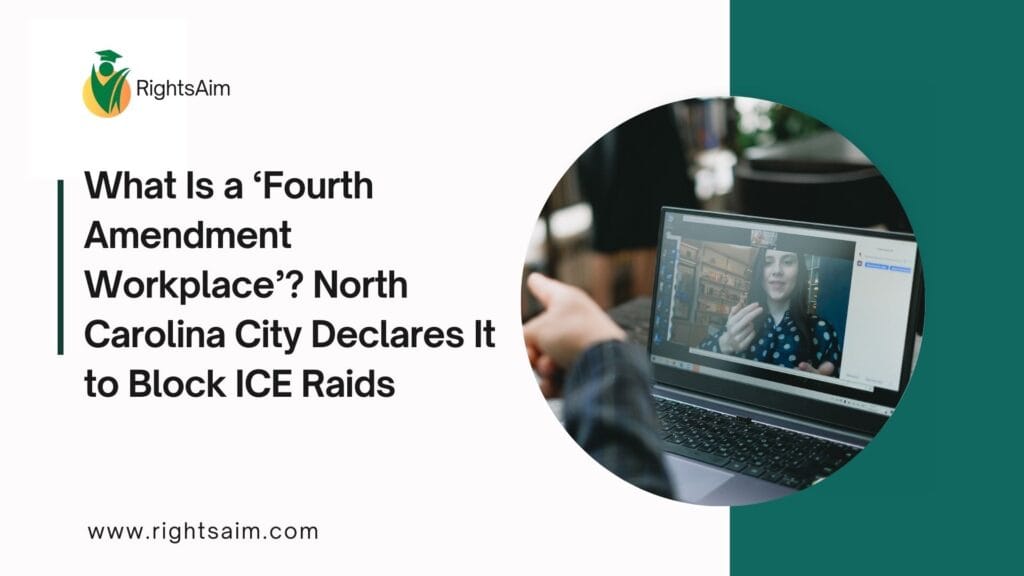
Table of Contents
Understanding the Fourth Amendment
The Fourth Amendment to the U.S. Constitution protects people from unreasonable searches and seizures by the government. It establishes that:
“The right of the people to be secure in their persons, houses, papers, and effects, against unreasonable searches and seizures, shall not be violated, and no warrants shall issue, but upon probable cause…”
In simple terms, it means that law enforcement officers need a judicial warrant or probable cause to enter private property or search individuals.
This protection extends not only to homes but also, in many circumstances, to workplaces.
What Is a ‘Fourth Amendment Workplace’?
A Fourth Amendment Workplace is a policy declaration by a city, county, or organization that it will not allow ICE or other federal agencies to enter non-public areas of workplaces without a judicial warrant.
Key principles include:
Limited Access: ICE officers can only enter public spaces of a workplace (like a lobby or reception) without a warrant.
Judicial Warrants Required: For accessing employee-only areas, a signed warrant from a judge—not just an administrative order—must be presented.
Employer Rights: Employers are informed of their legal rights to deny entry without a warrant.
Worker Protection: Employees, especially immigrants, gain a sense of security that raids won’t occur arbitrarily.
This policy does not mean cities can stop ICE from enforcing immigration laws, but it emphasizes constitutional compliance and limits cooperation to what is legally required.
Why Did a North Carolina City Adopt This?
The declaration comes amid growing concerns about ICE raids targeting immigrant workers in industries such as agriculture, food processing, and construction—sectors with large immigrant labor forces in North Carolina.
By becoming a Fourth Amendment Workplace city, the local government signals:
Support for immigrant communities who contribute significantly to the local economy.
Commitment to constitutional rights, ensuring that federal agencies respect due process.
Deterrence of warrantless raids, which often create fear and disrupt workplaces.
Local leaders argue that protecting workers from sudden raids fosters trust, community stability, and safer working environments.
How Does It Block ICE Raids?
The policy does not outright ban ICE but instead requires strict adherence to the Fourth Amendment:
If ICE arrives without a warrant – Employers are instructed not to allow entry beyond public spaces.
If ICE has an administrative warrant (issued by ICE itself, not a judge) – It is not sufficient for access to private areas.
If ICE has a judicial warrant – Access must be granted, but only within the scope of that warrant.
This significantly slows down ICE operations, as obtaining judicial warrants requires legal review and probable cause, unlike administrative warrants.
Broader Context: Local vs. Federal Authority
This move reflects a broader trend of local governments resisting federal immigration enforcement. Several cities across the U.S. have adopted “sanctuary” policies—limiting local police cooperation with ICE.
However, the Fourth Amendment Workplace model is narrower. Instead of declaring broad sanctuary, it specifically addresses workplace protections, making it legally harder for ICE to bypass constitutional safeguards.
Legal Standing of a Fourth Amendment Workplace
Constitutional Basis: The Fourth Amendment applies nationwide, so local governments are essentially reminding employers and workers of their rights.
Employer Obligations: Employers are not legally required to grant ICE access without a judicial warrant, so the policy aligns with existing law.
Potential Challenges: Critics argue that such policies obstruct federal enforcement and may face legal scrutiny. However, since the policy is rooted in constitutional rights, it has strong legal ground.
Impact on Workers and Employers
🔹 For Workers
Provides reassurance against surprise raids.
Encourages immigrant workers to report abuses without fear of deportation.
Builds trust in local governance.
🔹 For Employers
Clarifies legal responsibilities during ICE visits.
Reduces liability by ensuring actions comply with constitutional requirements.
Prevents workplace disruptions caused by sudden enforcement operations.
Criticism of the Move
Not everyone supports the Fourth Amendment Workplace declaration. Critics argue:
It could encourage undocumented workers to remain in the state.
It may strain relations with federal agencies, especially ICE.
Businesses could face tougher federal audits or retaliation for perceived non-cooperation.
Supporters counter that the move is not about shielding undocumented workers but about upholding constitutional rights that apply to all individuals, regardless of status.
Why This Matters Nationally
The North Carolina city’s decision could set a precedent for other municipalities, especially in states where immigrant labor is essential. With immigration remaining a divisive national issue, local governments adopting Fourth Amendment Workplace policies may reshape the conversation around rights, enforcement, and local autonomy.
For immigrant communities, it offers a layer of protection. For policymakers, it raises questions about how far local jurisdictions can go in resisting federal enforcement.
Final Thoughts
The declaration of a Fourth Amendment Workplace in North Carolina highlights the ongoing tension between federal immigration enforcement and constitutional rights. While ICE retains authority to enforce immigration laws, this policy ensures that such enforcement must respect the Fourth Amendment and the rule of law.
For now, the move is a significant step in affirming workers’ rights, protecting communities, and sparking a national dialogue about the balance between public safety, immigration policy, and constitutional freedoms.
As other cities watch closely, the Fourth Amendment Workplace model could spread, reshaping how localities respond to ICE raids and how immigrant workers experience safety in their workplaces.


